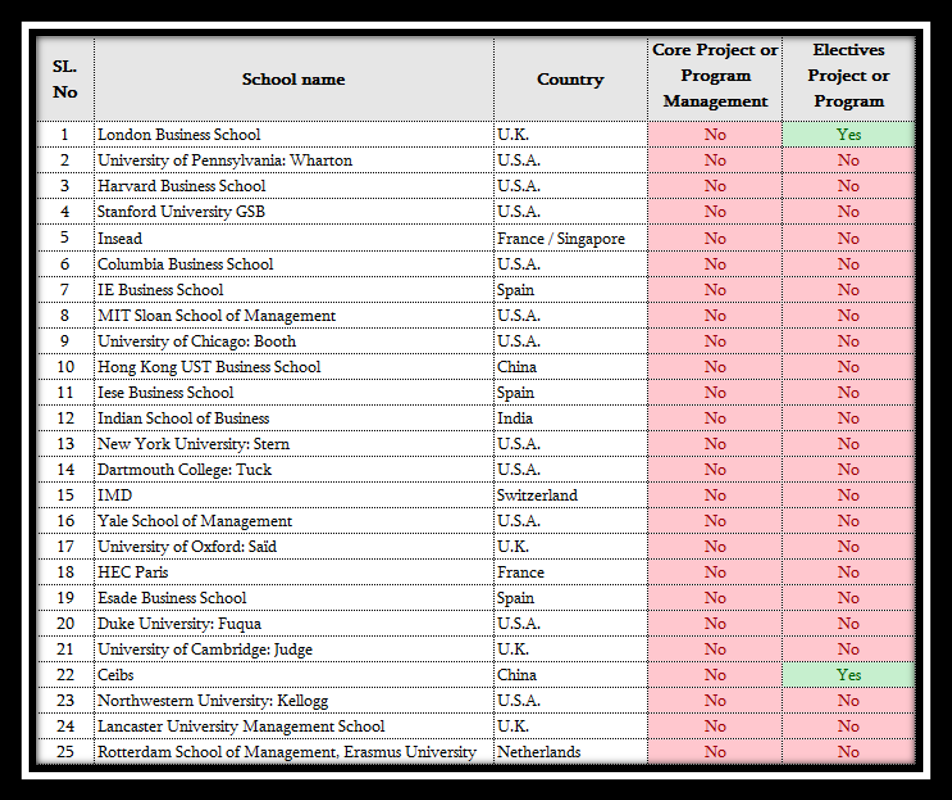
11 Apr Most MBA’s don’t teach Project Management; this is why they should
I spent years trying to understand why senior executives seem to neither understand project management nor regard it as an important means of their business to implement their strategy.
While conducting my research, I discovered that most CEOs view project management as a highly technical and tactical discipline–an area for engineers and IT professionals.
Consequently, they:
- Lack a basic understanding of how to link each of their strategic projects with the company’s overall strategy.
- Do not devote much time to developing project management competencies in-house.
- Fail to implement a formal project selection process and investment committee, which discusses, prioritizes, and decides on all the new project proposals.
- Lack the means to monitor the success or failure of their strategic projects
But why do so many senior executives feel this way? In an attempt to get to the deeper reasons for their views, some years ago I found out that:
1. Most of the highly regarded business management gurus, those that influence the way businesses are managed (e.g., Taylor, Drucker, and Porter), do not mention project management and/or the importance of its link with strategy execution in their theories.
2. In most of the finest business publications, such as McKinsey Quarterly, and Harvard Business Review – luckily this has changed now – project management is not a highly regarded topic.
3. Only very few top business school’s Masters in Business Administration (MBA) teach project management as part of their core course curriculum.
I will focus on the third finding, which is the main theme of my article today.
Project Management ignored by Most Top MBA Programs
After determining that most business management gurus and the finest business publications disregard project management and its link with strategy implementation, I wanted to find out whether the same was true at the top business schools. Specifically, I wanted to know whether the MBA programs at such world-renowned institutions as Standford, Harvard, and INSEAD, which teach the world’s future CEOs and senior executives, actually include project management as part of their core business curriculum.
Over the past 40 years, the MBA has become one of the most sought-after degrees in the world. Many of the current top managers have gone through this business program, and most future leaders will do so. The traditional MBA program has a duration of between 12 and 24 months, and it is divided into two blocks. The first block is composed of core courses, which are mandatory for every student. The second block comprises an extensive list of elective courses, from which students select a certain number that relates to their specialization.
Research into the Inclusion of Project Management Courses
Using the Financial Times ranking of the world’s top business schools, I researched whether any of them taught project management as either a core course or an elective. The chart below shows the results of my research (please note that together with Prof. Marco Sampietro we have done a refresh of this research that I will share in another newsletter):
The results are astonishing: Only two of the top 100 MBA programs in the world teach project management as a core course. The first business school that required its students to take a course in project management is the UK’s Cranfield School of Management which is ranked 26th in the world. The second and last business school that teaches project management as a mandatory course is the University of Iowa’s Tippie College of Business, ranked 64th in the world.
Why Project Management should be part of the core MBA curriculum?
A company without projects is something that no one can imagine. Projects are the best way to create significant value for an organization, via new products, international expansion, or acquisitions; also it is a good way to increase efficiencies or reduce costs. Without projects, there is no transformation. The selection and execution of the right projects can create a significant competitive advantage for a business. Project management has become a core competency for business leaders and managers, yet, as shown before, it is not taught in most of the Top MBAs in the world.
In addition, there are several reasons why I believe project management is important for an MBA program curriculum and its students. The three main ones are:
a) All of the MBA students (have been) or will be (sooner or later) involved in projects when the will join the business world after graduation. They might play a role as a sponsor, stakeholder, project leader, or team member, but it will be important that they know the basics of how to execute a project and make it successful.
b) As stated in my Harvard Business Review article, The Project Economy has Arrived, I see that many companies demand their high potential employees to have basic project management and execution skills and manage a large project in order to promote them to a more senior level (i.e. Philips, P&G, Siemens,…).
c) If Business Schools and MBAs don’t teach future leaders how to choose, prioritize and execute projects, who else will do it?
In the Project Economy, the future of work is project-based and most employees will become project managers, so I strongly believe that by 2030, most of the MBA programs in the world will offer project management as a mandatory course.
Have you come across any MBA that teaches project management as part of their core curriculum? or as an elective course?
Published by Antonio Nieto-Rodriguez 11th April 2022
https://www.linkedin.com/pulse/31-most-mbas-dont-teach-project-management-why-nieto-rodriguez/?trackingId=8W4DIyWYQoyKO5Xo%2B3Svyg%3D%3D


